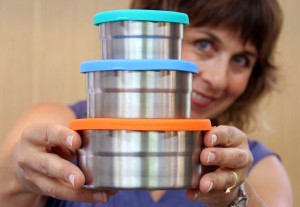ECOlunchboxes: the Convenience of Plastic Without the Plastic
By Lorrie Baumann
ECOlunchbox introduced its new Blue Water bento box line at this year’s International Home + Housewares Show. The stainless steel containers with silicone lids offer families a plastic-free option that avoids concerns about whether chemicals might be leaching from plastic containers into the food inside them.
Sandra Harris, ECOlunchbox’s Founder and President, started the company seven years ago after she’d become aware of concerns about the presence of bisphenol A (BPA), an industrial chemical used to make polycarbonate, a hard, clear plastic, in food storage containers. After it was shown that small, measurable amounts of the packaging materials may migrate into food and can be consumed with it, the packaging industry responded by abandoning the use of BPA for containers such as baby bottles and sippy cups.
These days, BPA is still in use in some applications where it comes into contact with food, and the federal Food and Drug Administration has decided that BPA is safe at the levels in which it’s currently found in foods that have been exposed to packaging that contains the chemical, but the agency continues to study this issue to resolve remaining uncertainties.
“We thought, better safe than sorry,” Harris says. Her family traded in their plastic water bottles for stainless steel, and Harris went looking for nontoxic, nonplastic food containers for families that just didn’t want to be exposed to the chemical. Her company launched in 2009 with a line of two stainless steel food containers and a backpack-style lunch bag with napkins that she designed and sewed from fair trade block-printed fabric that she sourced in India. She started out selling the containers and lunch bag at a local holiday fair. The products sold well there, so she went to a few other events in the San Francisco Bay area. “Within a few months, Whole Foods Northern California wanted to bring in the product line,” she says. “From there, we’ve gone on to sell over 285,000 ECOlunchboxes worldwide and have averted the disposal of millions of pieces of trash, mostly plastic.”
Today, Harris regards herself as a social entrepreneur who’s driving positive change for health and the environment through selling things. “The more we sell, the more change we make,” she says. Last year she was invited to participate in an event on Capitol Hill, where she shared the impact of the lunch boxes and talked about how the capitalist engine can be part of the solution to pollution. She was recently named the Small Business of the Month for April 2016 from California State Assembly District 16 by Assemblywoman Catharine Baker (R-Dublin), and she has also received other local awards for green business.
Her newest product line, the Blue Water bento line, was launched with a Kickstarter campaign in 2015 and introduced to the housewares industry at this year’s International Home + Housewares Show. “We’re a small business that turned to the community for support, and we got an enthusiastic response from more than 700 Kickstarter backers,” Harris says. “We got the funding to bring the line to market.”
The Blue Water bento line is nontoxic, plastic free containers that fit together as a set. They’re made with stainless steel bottoms and blue leakproof silicone lids patterned with a marine theme. The Splash Box is a rectangular bento box that tucks into a lunch bag along with two small Pods that fit right on top of the Splash Box. At the end of the day, the empty Pods nest inside the Splash Box, and it comes home collapsed together. “It offers the convenience of plastic without any plastic or any of the downside,” Harris says.
 The Seal Cup Trio is another similar lunch set, except that the containers are round rather than rectangular. They’re also made of stainless steel with silicone lids, and the set of three containers will hold a total of five cups of food. “We find that most people like to bring an entree and two snacks or two sides,” Harris says. “Three is just a real popular number when it comes to how people sort their food for lunchtime.”
The Seal Cup Trio is another similar lunch set, except that the containers are round rather than rectangular. They’re also made of stainless steel with silicone lids, and the set of three containers will hold a total of five cups of food. “We find that most people like to bring an entree and two snacks or two sides,” Harris says. “Three is just a real popular number when it comes to how people sort their food for lunchtime.”
ECOlunchbox products are currently sold at Bed Bath & Beyond and The Container Store as well as independent grocers and children’s boutiques nationwide as well as in Europe, Canada and Asia.

You must be logged in to post a comment.